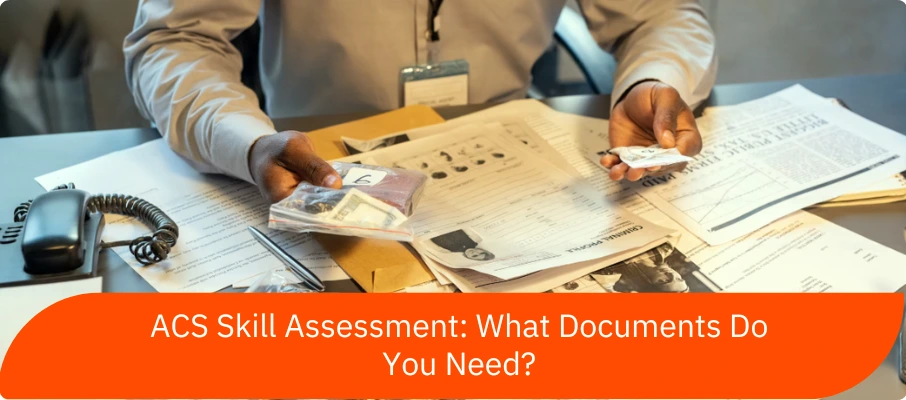
If you are an ICT professional seeking Australian skilled migration, the Australian Computer Society (ACS) Skill Assessment is a crucial step. This assessment evaluates your qualifications and work experience to determine if they meet the standards required for migration under the skilled occupation list.
The process can be complex, especially for applicants using the Recognition of Prior Learning (RPL) pathway. For a successful outcome, you must submit a well-prepared application supported by the correct corresponding documents.
This blog will help you understand the ACS Skills Assessment Guidelines, eligibility criteria, required documents, and tips for preparing an effective RPL report. By the end of this guide, you’ll be equipped with all the information you need to increase your chances of success.
What is the ACS Skill Assessment?
The ACS Skill Assessment is designed for ICT professionals who want to migrate to Australia under the General Skilled Migration (GSM) programme. The Australian Computer Society (ACS) is the assessing authority responsible for evaluating qualifications and work experience in the ICT field.
It ensures that your skills align with the nominated occupation listed in the ANZSCO (Australian and New Zealand Standard Classification of Occupations).
The assessment is mandatory for ICT-related occupations, such as:
- Software Engineer
- ICT Business Analyst
- Data Scientist
- Computer Network and Systems Engineer
- Developer Programmer
Applicants may be required to submit an RPL (Recognition of Prior Learning) application if they do not have a formal ICT qualification or if their qualifications do not align with ACS requirements.
The ACS Skill Assessment is not just a formality; it plays a pivotal role in your visa application process. A positive assessment can significantly enhance your chances of securing a visa, while a negative assessment can lead to delays or even rejection.
Therefore, it’s crucial to understand the ACS Skills Assessment Guidelines and prepare your application meticulously.
ACS Skill Assessment Eligibility Criteria
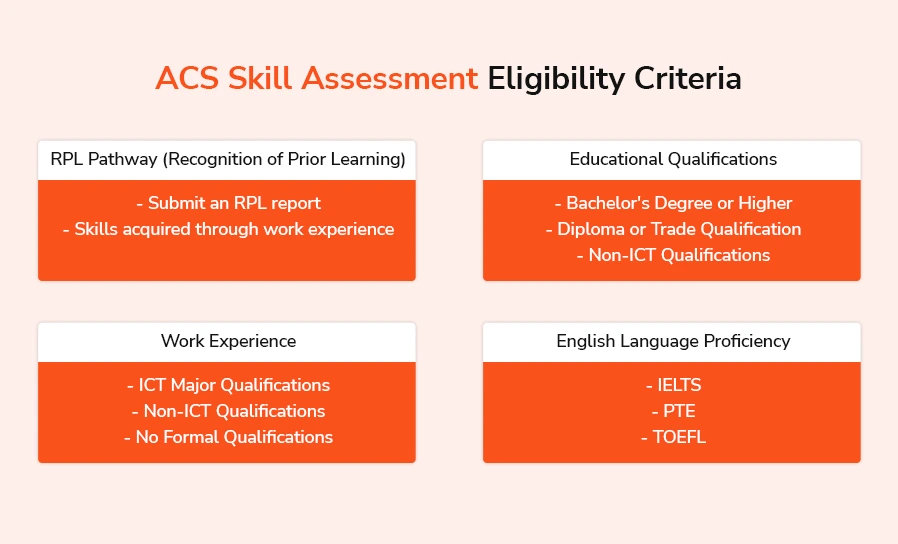
Before diving into the documentation and process, it’s essential to understand the eligibility criteria for the ACS Skill Assessment. The ACS has specific requirements that applicants must meet to be considered for assessment.
These criteria vary depending on your educational background and work experience.
1. RPL Pathway (Recognition of Prior Learning)
If you do not have any formal ICT qualifications, you can still apply through the RPL pathway. This requires you to
a. submit an RPL report
b. highlighting your skills acquired through work experience.
2. Educational Qualifications
The ACS evaluates your educational qualifications to determine if they are comparable to Australian standards. The following are the key points to consider:
a. Bachelor’s Degree or Higher
If you hold a bachelor’s degree or higher in an ICT (Information and Communication Technology) major, you may be eligible for a skills assessment. The degree should be relevant to the nominated occupation.
b. Diploma or Trade Qualification
If you have a diploma or trade qualification in an ICT field, you may still be eligible, but additional work experience may be required.
c. Non-ICT Qualifications
If your qualifications are not in an ICT field, you may still be eligible if you have significant work experience in an ICT role. However, additional documentation and evidence will be required.
3. Work Experience
Work experience is a critical component of the ACS Skill Assessment. The ACS requires a minimum number of years of relevant work experience, depending on your qualifications:
a. ICT Major Qualifications
If you have an ICT major qualification, you may need at least 2 years of relevant work experience in the past 10 years or 4 years of experience if your qualification is not closely related to the nominated occupation.
b. Non-ICT Qualifications
If your qualifications are not in an ICT field, you may need at least 6 years of relevant work experience.
c. No Formal Qualifications
If you do not have any formal qualifications, you may still be eligible if you have 8 years of relevant work experience and can demonstrate your skills through a Recognition of Prior Learning (RPL) application.
4. English Language Proficiency
While the ACS does not explicitly require an English language test, it is essential to note that the Department of Home Affairs (DHA) may require proof of English proficiency for visa applications.
Therefore, it’s advisable to prepare for an English language test such as
a. IELTS
b. PTE
c. TOEFL.
Documents Required for ACS RPL Skill Assessment
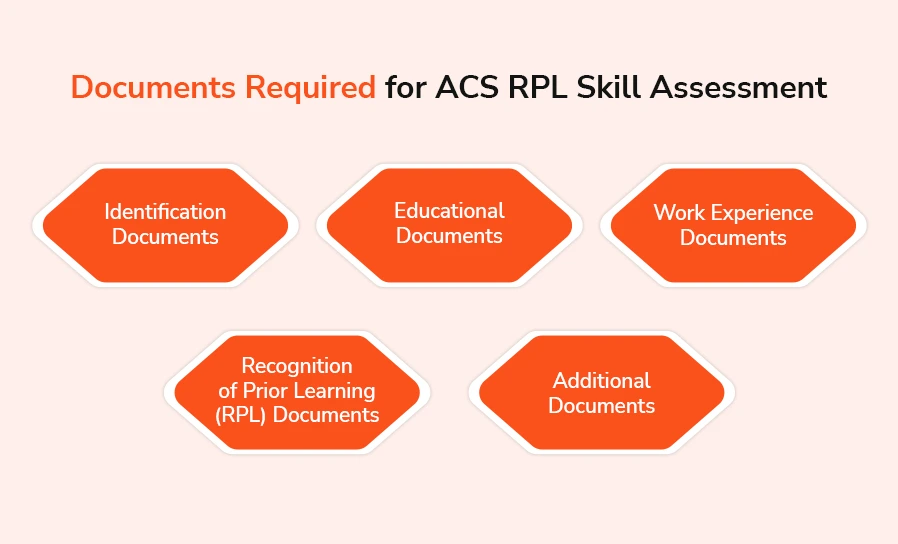
The ACS Skill Assessment requires a comprehensive set of documents to evaluate your qualifications and work experience. The documentation process can be complex, and missing or incomplete documents can lead to delays or rejection.
Below is a detailed list of the documents required for the ACS RPL Skill Assessment:
1. Identification Documents
- Passport: A clear copy of your passport’s bio-data page is required to verify your identity.
- Birth Certificate: If you do not have a passport, a birth certificate may be accepted as proof of identity.
- Name Change Documents: If your name has changed due to marriage or other reasons, you must provide legal documents such as a marriage certificate or deed poll.
2. Educational Documents
- Degree Certificates: Certified copies of your degree certificates, including bachelor’s, master’s, or doctoral degrees, are required. These documents should clearly state the qualification awarded and the date of completion.
- Academic Transcripts: Official academic transcripts detailing the subjects studied, grades obtained, and the duration of the course are essential. These transcripts should be issued by the educational institution.
- Course Curriculum: In some cases, the ACS may request a detailed course curriculum to assess the relevance of your qualifications to the nominated occupation.
3. Work Experience Documents
- Employment Reference Letters: Detailed employment reference letters from your previous or current employers are required. These letters should include the following information:
- Job title
- Employment duration (start and end dates)
- Hours worked per week
- Key responsibilities and duties
- Skills and knowledge gained
- Employer’s contact information
- Payslips: Recent payslips or salary statements can be used to verify your employment history.
- Tax Documents: Tax documents such as income tax returns or Form 16 (for Indian applicants) can serve as additional proof of employment.
- Appointment Letters: Copies of appointment letters or employment contracts can be submitted to verify your job role and responsibilities.
4. Recognition of Prior Learning (RPL) Documents
If you do not have formal ICT qualifications, you may need to submit an RPL application. The RPL application requires the following documents:
- RPL Application Form: A completed RPL application form detailing your skills, knowledge, and experience in the ICT field.
- Project Reports: Detailed project reports or case studies demonstrating your ICT skills and experience. These reports should highlight your role, the technologies used, and the outcomes achieved.
- Certifications: Any relevant certifications or training courses completed in the ICT field can be submitted to support your RPL application.
5. Additional Documents
- Resume/Curriculum Vitae (CV): A detailed resume or CV outlining your educational background, work experience, skills, and achievements.
- Statutory Declaration: In some cases, a statutory declaration may be required to verify certain aspects of your application.
- English Language Test Results: While not mandatory for the ACS Skill Assessment, English language test results may be required for visa applications.
Learn more: Learn more about document checklists for ACS RPL Assessment.✅
ACS Skill Assessment Process
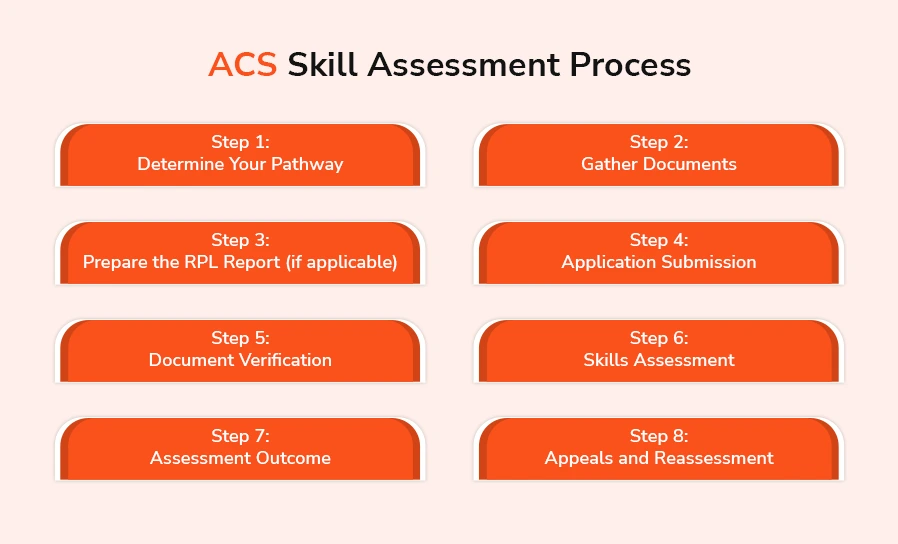
The ACS Skill Assessment process involves several steps, from submitting your application to receiving the assessment outcome. Understanding the process can help you prepare your application more effectively and avoid common pitfalls. Here’s a step-by-step guide:
Step 1: Determine Your Pathway
Identify the appropriate assessment pathway based on your qualifications and work experience. If you lack formal ICT qualifications, opt for the RPL pathway.
Step 2: Gather Documents
Collect all required documents, ensuring they are accurate, complete, and in the correct format (PDF).
Step 3: Prepare the RPL Report (if applicable)
RPL applicants must prepare a detailed report explaining how they acquired ICT skills through work experience.
Step 4: Application Submission
The first step in the ACS Skill Assessment process is to submit your application online through the ACS website. You will need to create an account on the ACS online portal, fill out the application form, and upload the required documents.
Ensure that all documents are certified and meet the ACS Skills Assessment Guidelines.
Step 5. Document Verification
Once your application is submitted, the ACS will verify the authenticity of your documents. This process may involve contacting your educational institutions and employers to confirm the information provided.
It’s essential to ensure that all contact details are accurate and up-to-date to avoid delays.
Step 6. Skills Assessment
After document verification, the ACS will assess your qualifications and work experience against the Australian standards for the nominated occupation.
This assessment involves evaluating the relevance of your qualifications, the depth of your work experience, and the skills you have acquired.
Step 7: Assessment Outcome
Once the assessment is complete, you will receive an outcome letter from the ACS. The ACS typically takes 6 to 8 weeks to assess applications. The outcome can be one of the following:
- Positive Assessment: A positive assessment means that your skills and qualifications meet the Australian standards for the nominated occupation. This outcome is valid for two years and can be used for visa applications.
- Negative Assessment: A negative assessment means that your skills and qualifications do not meet the required standards. In this case, you may need to provide additional documentation or reapply after gaining more experience or qualifications.
Step 8: Appeals and Reassessment
If you receive a negative assessment, you have the option to appeal the decision or request a reassessment. The appeals process involves submitting additional evidence or clarifying any discrepancies in your application.
It’s essential to carefully review the reasons for the negative assessment and address them in your appeal.
How Do You Write an Effective RPL Report for ACS?
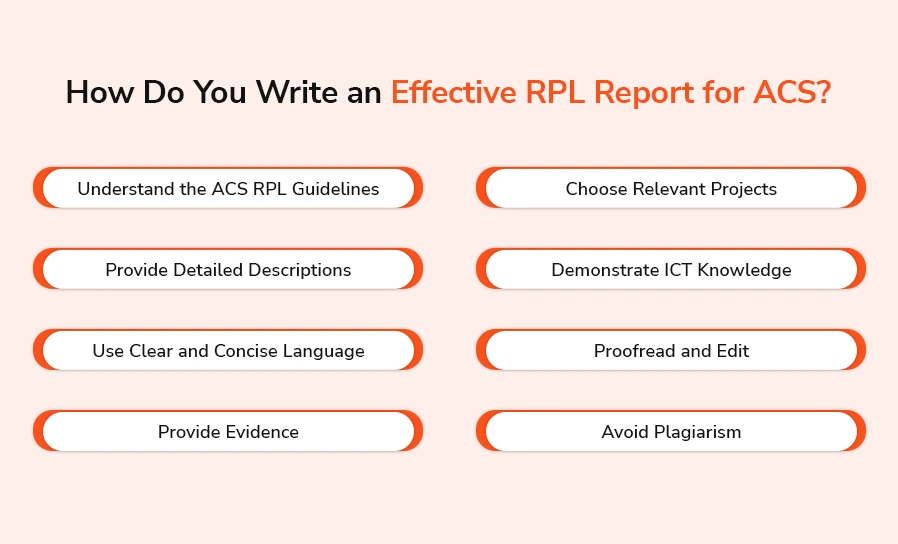
For applicants without formal ICT qualifications, the Recognition of Prior Learning (RPL) report is a critical component of the ACS Skill Assessment. The RPL report allows you to demonstrate your skills and knowledge through practical experience.
Writing an effective RPL report requires careful planning and attention to detail. Here are some tips to help you craft a compelling RPL report:
1. Understand the ACS RPL Guidelines
Before you start writing your RPL report, it’s essential to familiarise yourself with the ACS RPL guidelines. The ACS provides detailed instructions on the structure and content of the RPL report. Ensure that your report adheres to these guidelines to avoid rejection.
2. Choose Relevant Projects
Select projects that best demonstrate your ICT skills and experience. These projects should be relevant to the nominated occupation and highlight your ability to apply ICT knowledge in practical scenarios. Ideally, choose projects that you have personally worked on and can provide detailed information about.
3. Provide Detailed Descriptions
For each project, provide a detailed description that includes the following information:
- Project Title: A clear and concise title that reflects the nature of the project.
- Project Duration: The start and end dates of the project.
- Your Role: Your specific role and responsibilities in the project.
- Technologies Used: The technologies, tools, and methodologies used in the project.
- Challenges Faced: Any challenges or obstacles encountered during the project and how you overcame them.
- Outcomes Achieved: The results and outcomes of the project, including any measurable achievements.
4. Demonstrate ICT Knowledge
The RPL report should demonstrate your knowledge of ICT areas such as programming, database management, network security, and software development.
Provide examples of how you applied this knowledge in your projects and how it contributed to the success of the project.
5. Use Clear and Concise Language
Write your RPL report in clear and concise language. Avoid using jargon or technical terms that may not be familiar to the assessors. Ensure that your report is well-organised and easy to follow.
6. Proofread and Edit
Before submitting your RPL report, thoroughly proofread and edit it to ensure there are no grammatical errors or inconsistencies. A well-written and error-free report reflects your attention to detail and professionalism.
7. Provide Evidence
Back up your claims with real-world examples and detailed explanations.
8. Avoid Plagiarism
Ensure your RPL report is original. ACS uses advanced plagiarism detection tools and rejects plagiarised content.
Common Reasons for ACS Skill Assessment Rejection
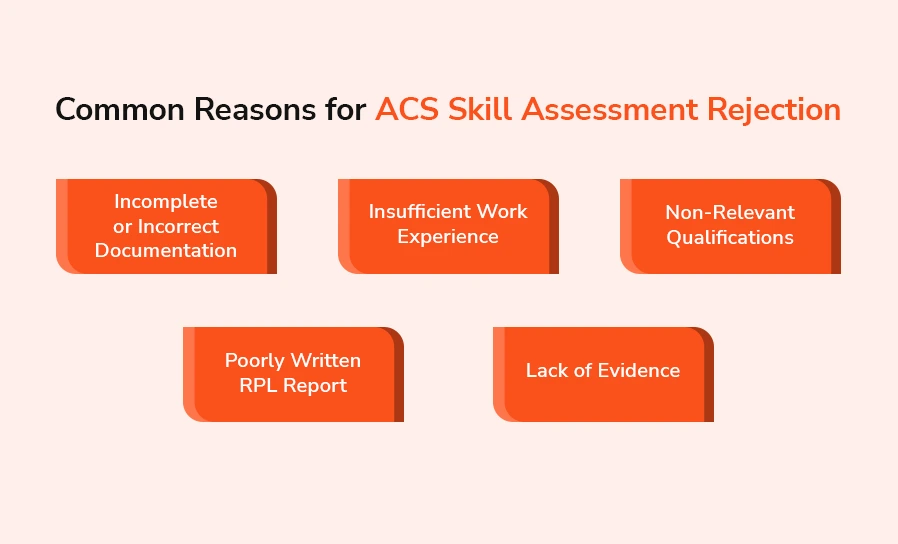
Despite careful preparation, some applicants may face rejection of their ACS Skill Assessment. Understanding the common reasons for rejection can help you avoid these pitfalls and increase your chances of a positive assessment.
1. Incomplete or Incorrect Documentation
One of the most common reasons for rejection is incomplete or incorrect documentation. Ensure that all required documents are submitted and that they meet the ACS Skills Assessment Guidelines. Missing or inaccurate documents can lead to delays or rejection.
2. Insufficient Work Experience
If your work experience does not meet the minimum requirements specified by the ACS, your application may be rejected. Ensure that you have the necessary years of relevant work experience before applying.
3. Non-Relevant Qualifications
If your qualifications are not relevant to the nominated occupation, your application may be rejected. Ensure that your qualifications align with the ICT field and the specific occupation you are applying for.
4. Poorly Written RPL Report
A poorly written RPL report can lead to rejection. Ensure that your RPL report is well-structured and detailed and demonstrates your ICT skills and knowledge effectively.
5. Lack of Evidence
If you fail to provide sufficient evidence to support your claims, your application may be rejected. Ensure that all claims made in your application are backed by relevant documentation.
Editors Choice: ❤️Key considerations in the employment reference letter for ACS skill assessment.✅✨
Tips for a Successful ACS Skill Assessment
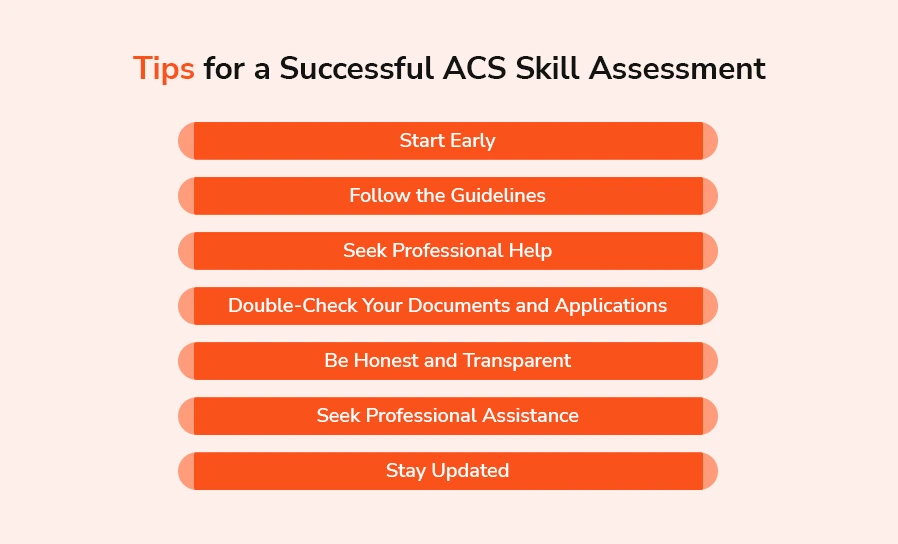
1. Start Early
The ACS Skill Assessment process can be time-consuming, so it’s essential to start early. Begin gathering your documents and preparing your application well in advance to avoid last-minute stress.
2. Follow the Guidelines
Ensure that your application adheres to the ACS Skills Assessment Guidelines. Carefully review the guidelines and follow them meticulously to avoid rejection.
3. Seek Professional Help
If you’re unsure about any aspect of the ACS Skill Assessment process, consider seeking professional help. Migration agents or consultants with experience in ACS assessments can provide valuable guidance and support.
4. Double-Check Your Documents and Applications
Before submitting your application, double-check all documents and information to ensure accuracy. Any errors or omissions can lead to delays or rejection.
5. Be Honest and Transparent
Be honest and transparent in your application. Provide accurate information and avoid exaggerating your qualifications or work experience. Any discrepancies can lead to rejection.
6. Seek Professional Assistance
If you’re unsure about the process, consider consulting a professional ACS assessment service.
7. Stay Updated
ACS guidelines and requirements may change, so always check for the latest updates before applying.
Conclusion
The ACS Skill Assessment is a critical step for IT professionals aiming to migrate to Australia. Understanding the eligibility criteria, required documents, and assessment process is essential for a successful application.
By following the ACS Skills Assessment Guidelines and preparing your application meticulously, you can increase your chances of a positive assessment and take a significant step towards achieving your migration goals.
Whether you’re applying with formal ICT qualifications or through the Recognition of Prior Learning (RPL) pathway, careful preparation and attention to detail are key.
By avoiding common pitfalls and seeking professional help when needed, you can navigate the ACS Skill Assessment process with confidence and achieve your dream of working and living in Australia.
FAQs
1. What are the requirements for the ACS skills assessment?
The requirements for the ACS Skill Assessment depend on your educational background and work experience. Here’s a breakdown:
- ICT Major Qualifications: If you have a bachelor’s degree or higher in an ICT field, you typically need at least 2 years of relevant work experience in the past 10 years. If your qualification is not closely related to the nominated occupation, you may need 4 years of experience.
- Non-ICT Qualifications: If your qualifications are not in an ICT field, you may need 6 years of relevant work experience.
- No Formal Qualifications: If you don’t have formal ICT qualifications, you can still apply through the Recognition of Prior Learning (RPL) pathway. This requires 8 years of relevant work experience and a detailed RPL report demonstrating your ICT knowledge and skills.
- English Proficiency: While the ACS does not require an English test, the Department of Home Affairs (DHA) may require proof of English proficiency (e.g., IELTS, PTE, or TOEFL) for visa applications.
- Documentation: You must provide certified copies of your identification, educational certificates, academic transcripts, employment reference letters, and other supporting documents.
2. How much time does ACS take for skill assessment?
The ACS Skill Assessment typically takes 8 to 12 weeks from the date of submission. However, processing times may vary depending on the complexity of your application, the volume of applications being processed, and whether additional documentation or verification is required.
To avoid delays, ensure that all documents are complete, certified, and meet the ACS Skills Assessment Guidelines.
3. What IELTS score is required for ACS?
The ACS itself does not require an IELTS score for the skill assessment. However, for visa applications, the Department of Home Affairs (DHA) requires proof of English proficiency. The minimum IELTS scores generally required for skilled migration visas are:
- Competent English: Overall band score of 6.0 (with no individual band less than 6.0).
- Proficient English: Overall band score of 7.0 (with no individual band less than 7.0).
- Superior English: Overall band score of 8.0 (with no individual band less than 8.0).
These scores may vary depending on the visa subclass and your points requirement. Always check the latest DHA guidelines for updated requirements.
4. How long is the ACS valid for?
The ACS Skill Assessment outcome is valid for 2 years from the date of issue. This means you must lodge your visa application within this period. If your assessment expires before you apply for a visa, you will need to reapply for a new ACS Skill Assessment.
5. How does ACS verify employment?
The ACS verifies employment through several methods to ensure the authenticity of your work experience claims:
Employment Reference Letters
The ACS requires detailed reference letters from your employers, which should include your job title, employment duration, hours worked per week, key responsibilities, and contact information of the employer.
These letters must be on official company letterhead and signed by an authorized person.
Payslips and Tax Documents
You may be asked to provide payslips, tax documents (e.g., income tax returns, Form 16), or bank statements showing salary deposits as additional proof of employment.
Employer Verification
The ACS may contact your previous or current employers directly to verify the information provided in your reference letters. Ensure that the contact details you provide are accurate and up-to-date.
Statutory Declarations
In some cases, if official documents are unavailable, you may submit a statutory declaration as supplementary evidence. However, this is not a substitute for primary documentation like reference letters or payslips.
By thoroughly verifying employment, the ACS ensures that your work experience claims are genuine and meet the required standards for skilled migration.
